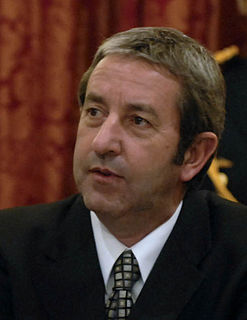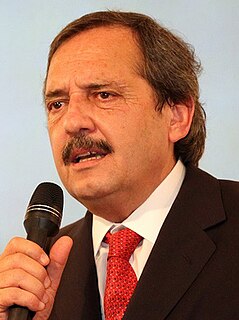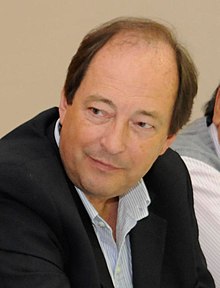The politics of Argentina take place in the framework of what the Constitution defines as a federal presidential representative democratic republic,where the President of Argentina is both Head of State and Head of Government. Legislative power is vested in the two chambers of the Argentine National Congress. The Judiciary is independent of the Executive and the Legislature. Elections take place regularly on a multi-party system.

Raúl Ricardo Alfonsín Foulkes was an Argentine lawyer and statesman who served as President of Argentina from 10 December 1983 to 8 July 1989. He was the first democratically elected president after more than seven years of military dictatorship,and is considered the "father of modern democracy in Argentina". Ideologically,he identified as a Radical and a social democrat,serving as the leader of the Radical Civic Union from 1983 to 1991,1993 to 1995,1999 to 2001,with his political approach being known as "Alfonsinism".

Civic Coalition ARI,until October 2009 known as Support for an Egalitarian Republic,is a centrist political party in Argentina founded in 2002 by Elisa Carrió.

The Radical Civic Union is a centrist and social-liberal political party in Argentina. It has been ideologically heterogeneous,ranging from social liberalism to social democracy. The UCR is a member of the Socialist International.

Elisa María Avelina "Lilita" Carrió is an Argentine lawyer,professor,and politician. She is the leader of Civic Coalition ARI,one of the founders of Cambiemos,and was National Deputy for Chaco Province and Buenos Aires.

Rodolfo Terragno is an Argentine politician and lawyer,former Senator and journalist. From 2016 to 2019,he was Argentina's ambassador to UNESCO.

Argentina held national presidential and legislative elections on Sunday,28 October 2007,and elections for provincial governors took place on staggered dates throughout the year. For the national elections,each of the 23 provinces and the Autonomous City of Buenos Aires are considered electoral districts. Voter turnout was 76.2%. Buenos Aires Province Senator and First Lady Cristina Fernández de Kirchner of the Front for Victory won the election by 45.28% of votes against Elisa Carrióof Civic Coalition ARI,making her the second female president of Argentina and the first female president to be directly elected. She broke the 40 percent barrier and won in the first round. Elisa Carriówon in the city of Buenos Aires and came second with more than 20 percent of the votes. Third was Roberto Lavagna,who won in Córdoba.

Julio César Cleto Cobos is an Argentine politician who was the Vice President of Argentina in the administration of President Cristina Fernández de Kirchner from 2007 to 2011. He started his political career as member of the Radical Civic Union party (UCR),becoming Governor of the Province of Mendoza in 2003. He was expelled from the UCR in 2007,and was then selected by presidential candidate Cristina Fernández de Kirchner,of the ruling Front for Victory (FpV),as her candidate for vice-president in the elections of that year,which they won.

Gerardo Rubén Morales is an Argentine politician,Governor of Jujuy Province and Secretary General of the Radical Civic Union.

Margarita Stolbizer is an Argentine lawyer and politician. Originally a member of the Radical Civic Union (UCR),she founded her own party,Generation for a National Encounter (GEN) in 2007. She has been a member of the Chamber of Deputies of Argentina on three occasions:from 1997 to 2005,from 2009 to 2017,and since 2021.

Ricardo Luis Alfonsín is an Argentine lawyer,academic and politician prominent in the Radical Civic Union. His father,Raúl Alfonsín,was the President of Argentina from 1983 to 1989. Since 2019,he has been Argentina's ambassador to Spain.

Argentina held national presidential and legislative elections on Sunday,23 October 2011. Incumbent president Cristina Fernández de Kirchner of the Front for Victory won via landslide,with 54.11% of votes against Hermes Binner of Broad Progressive Front,she also secured a second term in office after the Front for Victory won just over half of the seats in the National Congress.
K Radicalism also known as Radicales K were a faction within the Radical Civic Union (UCR),a political party in Argentina.

Broad Front UNEN was an center-left political coalition in Argentina. It arose through an alliance between Radical Civic Union,Civic Coalition ARI,Proyecto Sur,Freemen of the South Movement,Socialist Party,Authentic Socialist Party,and GEN.

Juntos por el Cambio is a centre-right political coalition in Argentina. It was created in 2015 as Cambiemos,and renamed in 2019. It is composed of Republican Proposal,Radical Civic Union,Civic Coalition ARI.

Raúl Eduardo Baglini was an Argentine politician and lawyer who served in both houses of the National Congress of Argentina,representing the Radical Civic Union.
Evolución Ciudadana or simply Evolución,was an Argentine political coalition founded by Martin Lousteau in the City of Buenos Aires.

Paula Mariana Oliveto Lago is an Argentine lawyer and politician. She is currently a member of the national Chamber of Deputies elected in the city of Buenos Aires for the 2021–2025 term. She is also president of Civic Coalition ARI (CC-ARI).
Generation for a National Encounter,sometimes known as the GEN Party or simply as GEN,is a centre-left political party in Argentina. It was founded in 2007 by Margarita Stolbizer as a split from the Radical Civic Union,in opposition to the UCR's endorsement of Roberto Lavagna's general election.

Pamela Fernanda Verasay is an Argentine politician,currently serving as a National Deputy elected in Mendoza Province since 2021. She previously served as a National Senator for Mendoza from 2015 to 2021 as well. Verasay belongs to the Radical Civic Union (UCR).

















